Lifestyle
Montenegro will be the first country in the region to adopt a process of smart specialization implemented by the Ministry of Science of Montenegro and the European Commission's Joint Research Center, which will enable an intensive transition to the economic knowledge, attracting EU funds and directing public and private investments.
This was said at the International Workshop dedicated to the process of smart specialization, by Sanja Damjanovic, Minister of Science, stating that the project of smart specialization is part of the Multi-Annual Action Plan for the Western Balkan Countries, which is important for all the economies in the region, as reported by the PR Center.
"By entering this challenging process in early 2017, in cooperation with several ministries, we have continuous support from the European Commission's Joint Research Center," Damjanovic said.
She said that in the past 18 months, the ministry had implemented numerous activities in the process of defining guidelines for the Smart Specialization Strategy 2018-2024, in which, as she stated, 300 representatives of state institutions, economic and scientific communities and civil society participated.
"The result of such a comprehensive approach is identifying priority areas of science-based and innovation-based development, namely, renewable energy and energy efficiency, sustainable agriculture and food value chains, new materials and sustainable technologies, sustainable health tourism and information-communication technologies as a horizontal platform," explained Damjanovic.
She said that international and regional cooperation could contribute to better results in implementing the strategy of smart specialization.
"It is a challenging road ahead, but I believe that the Western Balkans can make an efficient transition towards the economic knowledge, given that the region has undergone intensive technological development in the past and made significant scientific achievements," Damjanovic said.
The Deputy Director General of the Joint Research Center of the European Commission, Čarlina Vičeva, said that the process of smart specialization is a complicated one implemented in the countries that are members of the European Union.
"Montenegro has recognized the potential of smart specialization, based on knowledge, technologies and innovations, for its future development. By entering this challenging process in early 2017, in cooperation with several ministries, one of the ways to motivate states in which the process of European integration is ongoing, is that this concept that is represented in the EU is also applied in those countries that are preparing for the entry. Smart specialization provides economic transformation and knowledge-based economy," said Vičeva.
She said Europe has a highly profiled social model, which does not provide the EU members with the opportunity to compete in the world market by price or cheap labor.
"This is not a viable way of competing on the world market, and the only way to become competitive on the market is to base our competencies on innovations, new solutions and products, using everything science has done to achieve economic transformation. That’s why we must focus on investment, research and development," said Vičeva.
She said that cooperation of the region is of the utmost importance and that it is essential that all strategic guidelines are based on cooperation.
Head of the European Union Delegation in Montenegro, Aivo Orav, pointed out that the project of smart specialization is an important initiative for Montenegro as well as for the Western Balkans region, as this project will, as he pointed out, improve research innovations and enable new jobs.
Economic governance is one of three critical steps for the expansion of the strategy and it is natural that both the EU and Montenegro consider this to be a priority for the Western Balkans. Structural reforms are needed to attract as many domestic and foreign investments as possible," Orav said. He stressed that the purpose of the smart specialization project is to strengthen the planning of innovative policies so that countries can boost economic growth and create new jobs.
"This is something that all the economies of the Western Balkan countries can benefit from. Thanks to the hard work of all countries in the region, innovation is now at the heart of political agendas in the Western Balkans," stated Orav.
Text by Vijesti online, on February 5th 2019, read more at Vijesti
05 February 2019 - Three parking ticket payment machines in Podgorica will start functioning as of today, writes Pobjeda daily. They are located at the crossroad of Sloboda and Hercegovačka Street, at the corner of Bokeška and Njegoševa Street and the Balšića Square (near the restaurant “Radovče”).
The Parking Service is also expecting the application “Digital Kiosk” to start functioning this week as well. Head of the Parking Service, Nusret Canović, said that the testing period of the parking ticket pay machines has been finished and now everything is ready for their work.
“The new machines receive paper money and coins as well. Machines will have multiple languages which are especially important for foreigners, as this is the easiest way for them to pay the parking tickets in the capital,” said Canović.
He reminded of the fact Podgorica already has three parking ticket payment machines – in Vaka Djurovića Street, near the Clinical Center of Montenegro and "Preko Morače".
“This will be the very first official application for paying to park. It has already been designed for Android, and now we are waiting for it to be designed for iOS software. The application enables the users to pay the zone parking, and it shows them what zone they are in. Also, thanks to the application “digital kiosk”, it will be possible that the citizens pay the parking lot using their payment cards,” said Canović earlier when he announced new parking payment machines.
“We will examine every location individually and make logical prices for every part of the town. Locations that are not located in the center of the town will have lower parking prices. It will be a price list adapted to the real needs and demands of citizens,” concluded Canović.
05 February 2019 - Minister of Culture Aleksandar Bogdanović opened the manifestation Creative Montenegro: Days of Montenegro in Zagreb. The programme began with the opening of the exhibition of the Association of Artists of Montenegro "26> 41", the presentation of the products of creative industries of Montenegro and the performance of the Montenegrin violinist Verica Čuljković.
Nataša Owens, President of "European Movement Croatia" and "European House Zagreb", Boro Vučinić, Ambassador of Montenegro to the Republic of Croatia and Milan Bandić, Mayor of the City of Zagreb also spoke at the opening.
"Such a manifestation, which offers an insight into the cultural and economic situation of the state, clearly focused on Euro-Atlantic integrations, is also the place of exchange of experience gained in the process of these integration," Minister Bogdanović noted.
Ambassador Vučinić said that Montenegro is committed to a common Euro-Atlantic perspective and ready to develop good relations with everyone in the region, especially with those sharing the same goals and values.
"Of course, the special place belongs to a friendly Republic of Croatia, which has so far shown the willingness to support Montenegro on its European path. This is an opportunity to wish our neighbours a successful EU presidency next year," Vučinić said.
Mayor of the City of Zagreb Milan Bandić expressed satisfaction with his presence at the event and stressed that this is another proof that works of art find a common language and connect people at a higher level.
The event, organised at the European House in Zagreb, will last until 13 February 2019.
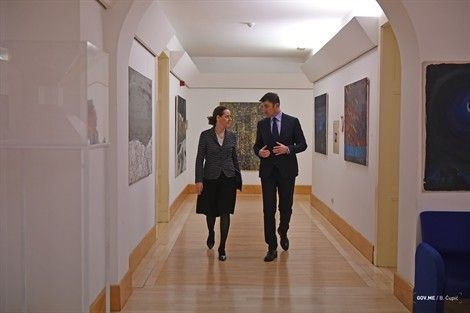
During his stay in Croatia, Minister of Culture Aleksandar Bogdanović also met with Minister of Culture of the Republic of Croatia Nina Obuljen Koržinek.
The meeting discussed the cooperation between Montenegro and the Republic of Croatia so far and stressed that the two countries foster friendly relations in all areas.
The two officials expressed satisfaction with the meeting in Zagreb on the occasion of organising the Day of Montenegro in Zagreb - Creative Montenegro and stated that such manifestations additionally strengthen our cultural links and bring people closer.
Minister Bogdanović pointed out that significant progress has been made so far in strengthening cultural ties, both in the field of contemporary creativity and in the field of preservation of cultural heritage, which is particularly evidenced by projects that we are jointly implementing at both bilateral and international level.
The meeting also discussed the further implementation of the previously signed Memorandum between the Ministry of Culture of Montenegro and the Ministry of Culture of the Republic of Croatia on cooperation in the field of protection and preservation of underwater cultural heritage for the period 2017-2020 and the agreed continuation of cooperation and exchange of knowledge and experience between institutions in this field.
Special emphasis was put on cooperation in the field of creative industries and it was pointed out that Croatian experience will be of great importance for Montenegro, taking into account the full commitment of the Ministry of Culture to their development. In this context, both sides expressed readiness for cooperation in the implementation of IPA projects.
In the hall of King Nikola's Castle on Thursday, the "Trio Flamenko" from Belgrade and with their exceptional music put the full stop on a diverse January program of the Winter Scene of "Barski ljetopis". This virtuoso composition consists of Branko Kljajić (guitar and bouzouki), Željko Stepanović (accordion and vocal) and Uroš Ranković (piano).
Their sixty-minute repertoire led the audience to the warmest parts of Europe, and the ease and the naturalness of their performances left the impression that the Mediterranean is in their blood.
Joint love for that sound and genre united these three musicians, revealed Željko Stepanović.
"All three of us love the same music, and when you love something that you do, you know it yourself, no day is a working day! We love Spain, France, Greece, Italy, and these are all the countries where the compositions from our repertoire originate from without which nothing can pass by" said Stepanović, adding that in the repertoire, however, always remains a part of the music from our region.
For their first performance at "Barski ljetopis" they especially prepared a jazz remake of the Montenegrin composition "Jos ne svice rujna zora", which the audience greeted with a thundering applause and double encore, and as Stepanovic said, this traditional song perfectly fitted into their style.
Montenegro is in the Mediterranean, has fantastic music and a long tradition, and most importantly, we can respect all of that with our soul. When we can, we move it to the audience, and it can be felt immediately, "he added.
For more than half of the concert the audience participated equally as the fourth member of the band, and it seemed, at moments, they even held back, and Stepanovic invited them with a smile to join him in the vocal performance.
"I asked you, a couple of times, to sing with us, and you did, and it was fantastic! It's always nice to have an interaction with the audience, because when you do not have it, then we played in vain," Stepanovic said, and the impressions of the satisfied audience confirmed that this concert had closed the January winter scene spectacularly.
In February, the audience is to expect an equally interesting repertoire. On next Thursday, February 7th, at Dom kulture, the play "Crvena", by the Montenegrin director Danilo Marunović, produced by Budva "Theater City" will be performed, in which the lead roles are Branislav Lečić and Marko Grabež.
Text by CdM, on February 1st 2019, read more at CdM
NGO "Alfa Center" from Niksic has begun with the realization of the project "Safe Step" within which educational workshops for students of third-grade primary schools throughout Montenegro will be held as well as a two-day seminar for teachers.
"Having in mind that changing habits in adult traffic participants is extremely demanding, hard-working and long-lasting, we have planned a series of educational workshops with the students of this age at Alfa Center. This is so that the message will be carried to older participants, and that they are small guardians of the order during the rides in the car and the promoters of the general traffic culture," said Marina Došen, project coordinator.
The seminar aims to point out the educators and principals of elementary schools to the obligation and the possibility of studying the topic of traffic through the multisectoral approach in the curriculum for elementary schools.
The "Safe Step" project represents a set of interrelated activities aimed at increasing the prevalence of traffic safety in elementary schools and increasing the level of knowledge of elementary school pupils in this area. The first elementary education workshop will be held in Niksic and will be organized with the support of the Ministry of Education and Police Administration.
Text by Svetlana Mandic, on February 4th 2019, read more at Vijesti
The prestigious 52nd Herceg Novi Winter Salon, which practically marked the beginning of 50th Mimosa Festival, as always, was held in the Gallery Josip Bepo Benković, and beside a great number of visitors, there was the unusual presence of 18 of 20 artists and exhibitors.
Sculptor Miodrag Šćepanović from Kolasin won the first prize. The second was won by the painter Marija Vemić from Nikšić, and the third an artist from Mostar, Silva Radić. By declaring the jury's decisions, President Radoslav Milosevic Atos has estimated that the entire selection of various works is not a reason but a result, an inspiration to be better as human beings through the art.
The selector, art historian Senka Subotic, under the motto PARALLELS, conceived the exhibition as a synthesis of the various artistic expressions of the author, who in parallel create and operate in the territory of ex-Yugoslavia and beyond, with the intention of presenting the state of contemporary painting in this area. In addition to artists from Montenegro, she selected works by authors from Banja Luka and Mostar Academies, while, as she explained, there were no funds for presenting authors from other countries of the region.
By opening the exhibition, the artist from Mostar, Silva Radic, pointed out that the Salon is a symbol that combines different stories and symbols:
"Twenty authors tonight, with their symbolic sentences, their works have also left a trace in time. It will also leave a trace in each observer that opens himself to the world of symbols," Radić says.
This year, the selected artists were chosen by selector in consultation with colleagues from the Sorbonne and from the Association Salon New Reality in Paris, which quite clearly shows the quality of the 52nd Winter Salon and the responsibility of the selector for the event that lasts more than half a century, says the president of the municipality, Stevan Katic.
"Parallels, the theme of this Winter Salon, point to what is common and different. I believe that is the same in other segments of life - by seeing parallel opinions and attitudes we see differences, it gives us the opportunity to look better and more, focusing on the truth, whatever it is. Only in this way are we improving ourselves. We can envy the artists - they see what is hidden from us, they point it to us and reveal it, and it is up to us, everybody within their capabilities, to draw a lesson or an opinion," Katić pointed out.
First-rate prize-winning Montenegrin sculptor Miodrag Šćepanović for his work "Zatišje" says that he was firstly very surprised by the invitation to take part in the Salon, for which he is grateful to the organizer and then for the award. The 52nd Herceg Novi Winter Salon at the Josip Bepo Benković Gallery can be seen by visitors in the next 50 days during the Mimosa Festival.
Text by Radio Jadran, on February 1st, 2019, read more at CdM
Tourists and Citizens of Herceg Novi had a chance to get acquainted with the culture and specifics of Japan, Great Britain, Slovakia, Australia, and China at the Newcastle of the World Day, which was held within the program of the 50th Mimosa Festival.
The event was marked with the performances of the artists from Hejin, China, who featured face-changing skills and performed with Chinese traditional instruments. The sounds of bagpipes from North Umbria in England were played by Steel Rigg, Japanese guests featured the art of calligraphy, origami and social games, and Klapa Lira from Herceg Novi and the Art Center As, as well as the students of Herceg Novi Music School, also participated in the program.
The head of the Office for International Cooperation in the Municipality of Herceg Novi, Simonida Kordić, said the Newcastle of the World Day project was held in Herceg Novi for the first time this year.
"It's a project that takes place within the organization of Newcastle of the World. Last year Herceg Novi became a member of this international organization, which gathers over 40 cities from all over the world," Kordic explained.
Herceg Novi, as she pointed out, is one of the central members of the organization, "which is a great success for us as the Municipality and our Office for International Cooperation."
"We are very pleased to be in such an organization that creates a network of projects that link people from the field of culture, tourism, education, and economics from all the world's cities. Last year, the 20th anniversary of this event was held in Japan, where Herceg Novi was admitted to the organization," Kordic said.
According to her, guests from Japan, UK, Slovakia, Australia, America, China participated in the event.
"Everyone brought what is characteristic of their city, and Herceg Novi now has the opportunity to present its art and virtues," Kordic said.
The President of the Municipality Herceg Novi, Stevan Katic, assessed the program Newcastle of the World Day as significant, stating that he was pleased that Herceg Novi hosted numerous cities in the association of Newcastle cities.
"For Herceg Novi, it is good that we signed the Charter on the entry of our town to the Newcastle Town Association in October. And after three months, the results of the entry into the association are visible. I am pleased that this event takes place within the 50th Mimosa Festiva," said Katic.
He also announced other planned events that will be held for the first time in Herceg Novi. "It is also significant that Herceg Novi will host, for the first time, a show of all city music orchestras from Europe, the region and the majorettes. This is an important event for our city, which will also bring Europe and the world to Herceg Novi," Katić said. Rumi Matsushita from Japan explained that the city he comes from is a member of Newcastle, saying that today in Herceg Novi they represent a part of the Japanese culture - calligraphy.
"The boys who visited us today are very much interested in calligraphy, so they became part of our presentation today and we are showing them calligraphy," said Matsushita.
She said that she is in Herceg Novi for the first time, and evaluates that the Mimosa Festival is "fantastic".
Representative of the delegation from the town Nove Zamki from Slovakia, Katarina Hozlarov, said that they came to Herceg Novi to present their small town, which is also a member of the organization.
In history, the city of Nove Zamki played an important role because it was a fortress that has defended Europe from the Turkish invasion. Although we do not have any fortresses in the city, we can offer our hospitality to the tourists, the remains of historic architecture, and a good sports program. I think there is always something nice to see, "Hozlarov said. A representative of Newcastle upon Tyne, a town in the north of the UK, Sue Wilson, said the entire project came from their city, stating that they now have many cities that are members of the association around the world.
"We are doing student exchange, cultural exchange, different business events. Twenty years ago, at my colleague's initiative, I wrote the book Newcastle of the World. At the same time, the city of Japan Shin Siro began to hold conferences. Meanwhile, these two projects merged after 20 years of alliance, I wrote a second book with the same name. Now we have more than a thousand cities as alliance members," Wilson said.
Text by PR Center, on February 3rd 2019, read more at CdM
February 4, 2019 - The Hotel Regent Pop Up Restaurant is ready to welcome gourmands and excellent chefs of Boka Bay; which they proved with a presentation of the degustation menu “Montenegro Inspired” organized on the last day of January. By the end of March, the Pop Up Restaurant will offer their guests an entirely new line to present the selection of Bokelian and dishes of Boka Bay hinterland. The jury will choose among 35 recipes from local masters of the kitchen who responded to the hotel management's invitation to share their knowledge in a joint mission of the presentation of the best local gastronomic tradition to hotel’s guests, coming from all over the world.
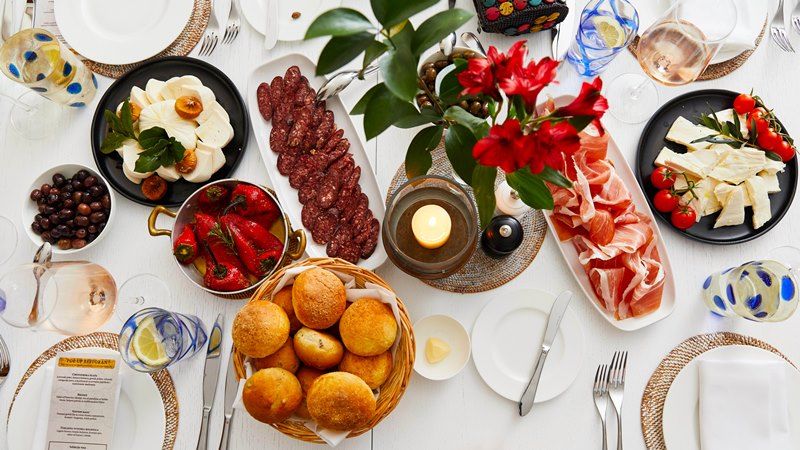 Regent Selection- Montenegrin Plate, photo by Zoran Radonjic
Regent Selection- Montenegrin Plate, photo by Zoran Radonjic  Photo by Zoran Radonjic
Photo by Zoran Radonjic 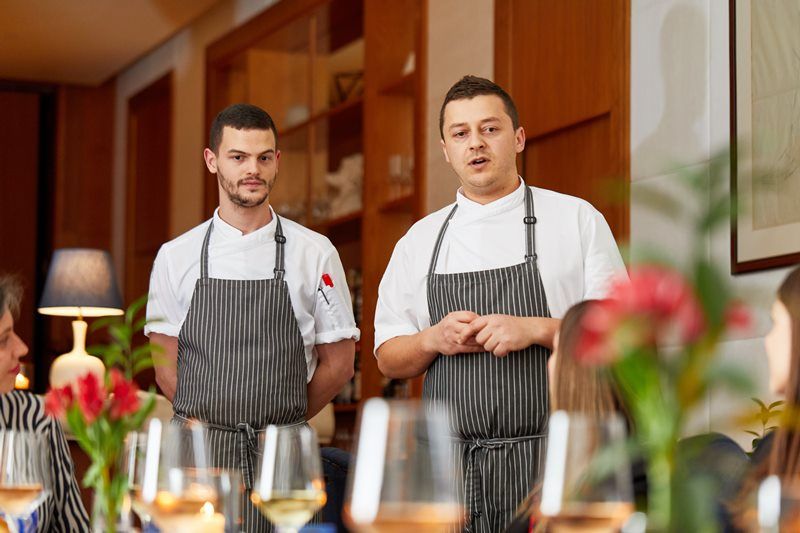 Regent's Team of Chefs, photo by Zoran Radonjic
Regent's Team of Chefs, photo by Zoran Radonjic 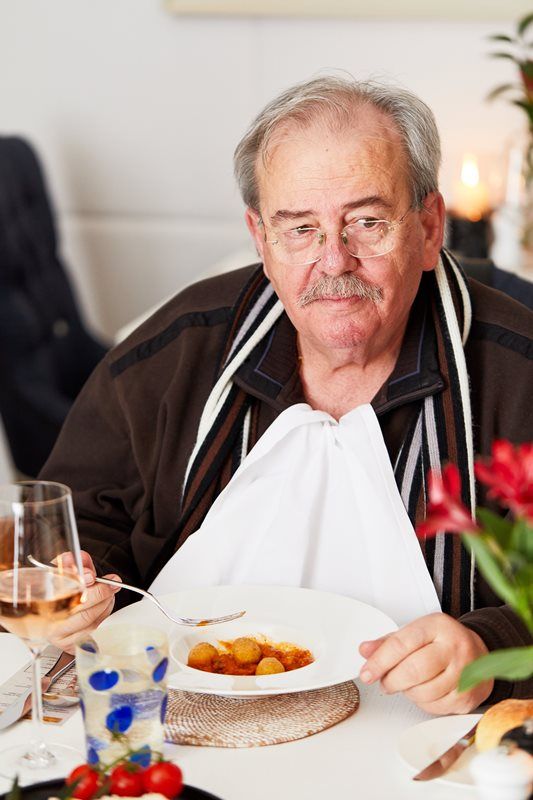 Maso Cekic, famous journalist, Chef and gastro blogger of Boka Bay, Photo by Zoran Radonjic
Maso Cekic, famous journalist, Chef and gastro blogger of Boka Bay, Photo by Zoran Radonjic 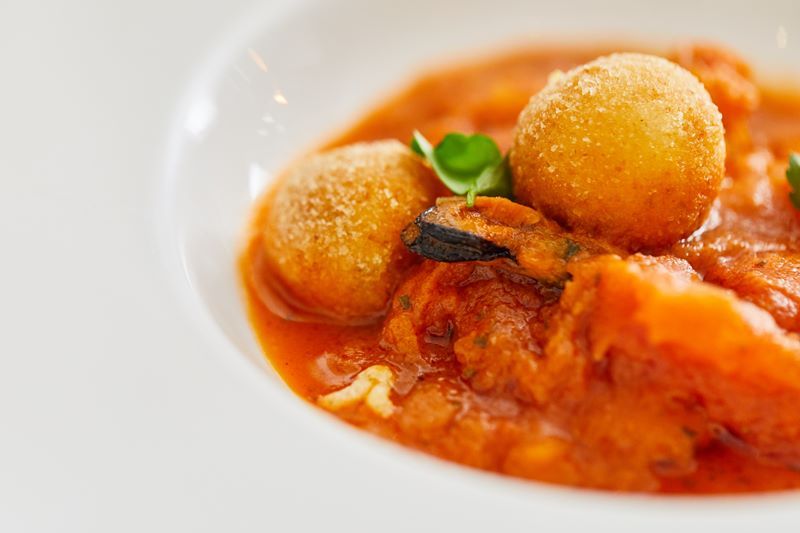 Brodet with crispy polenta with Mediterranean herbs, Photo by Zoran Radonjic
Brodet with crispy polenta with Mediterranean herbs, Photo by Zoran Radonjic 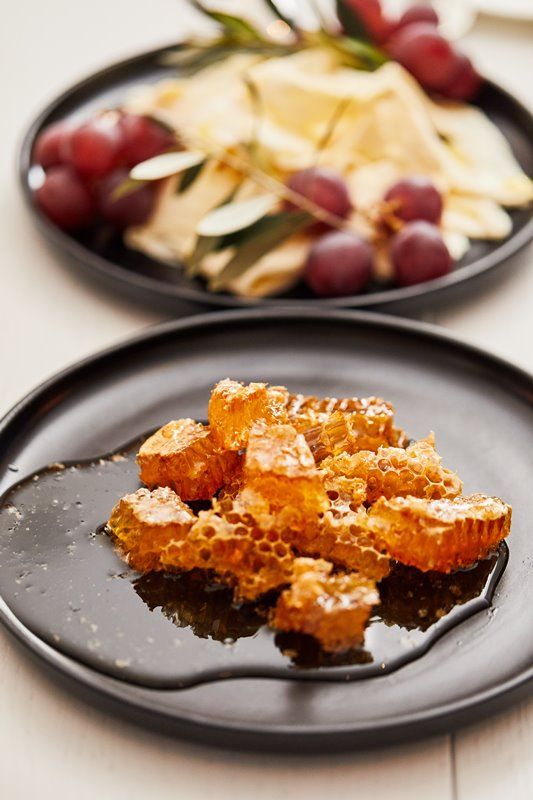 Honey and cheese, Old Montenegrin Tradition, Photo by Zoran Radonjic
Honey and cheese, Old Montenegrin Tradition, Photo by Zoran Radonjic 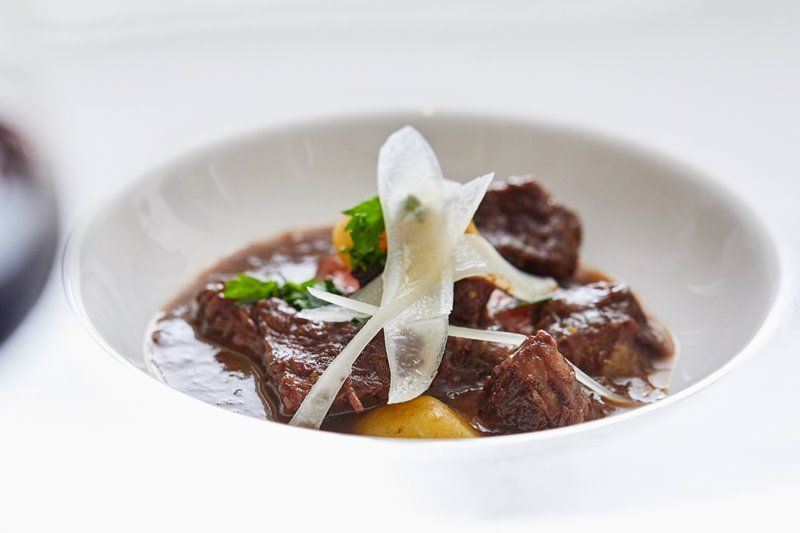 Beef Stew, Photo by Zoran Radonjic
Beef Stew, Photo by Zoran Radonjic 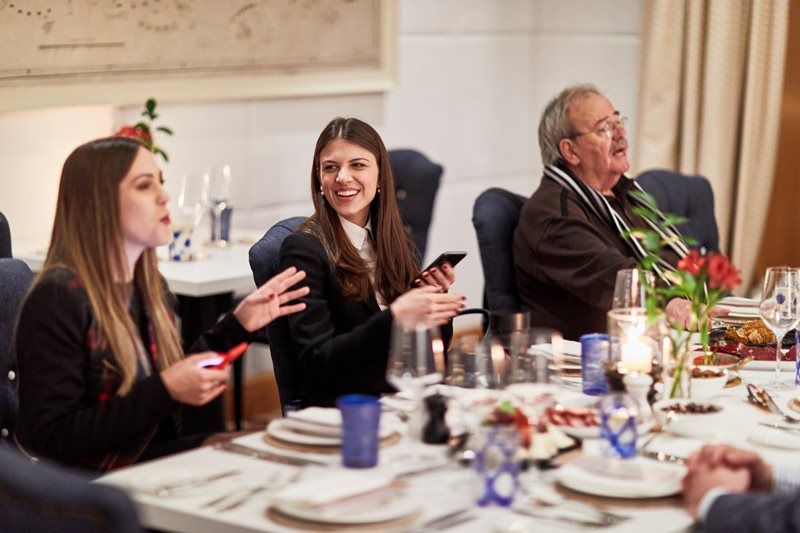 Montenegrin Food Blogeer, Danijela Lazovic
Montenegrin Food Blogeer, Danijela Lazovic  Smoked Pork Shank, Photo by Zoran Radonjic
Smoked Pork Shank, Photo by Zoran Radonjic 03 February 2019 - Minister of Culture Aleksandar Bogdanović paid an official visit to the Republic of Italy, during which he met with Italian Minister for Cultural Heritage and Activities Alberto Bonisoli.
Minister Bogdanović expressed satisfaction with the meeting with his Italian counterpart, emphasising the high level and quality of cooperation that Montenegro and the Republic of Italy have in all areas of culture.
The two officials agreed that the recent ratification of the Agreement in the area of education and culture in the Assembly of the Republic of Italy represents a strong foundation and an incentive for future cooperation. To implement it more dynamically, both sides agreed to establish a joint Committee to deal with the identification of priority areas for cooperation, as well as their implementation.
Minister Bogdanović highlighted the importance of exchanging experiences and knowledge with Italian experts in the field of cultural heritage.
"Preserving the rich cultural heritage, but also its tourist valorization, represent only some of the areas in which we will work with our friends from the Republic of Italy. Many years of experience, as well as the expertise and skills of our colleagues from Italy in this field, will be a strong support to overcoming the challenges that Montenegrin cultural heritage encounters," Minister Bogdanović said.
Minister Bonisoli expressed the readiness of the Republic of Italy to provide training in Florence through several education processes for several Montenegrin conservators and restaurateurs.
The Ministers also discussed cultural cooperation, primarily through active participation of the National Research Council of Italy in the field of research in the area of Duklja, the former Roman city, as one of the oldest archaeological sites that has been on the Tentative List of Montenegro for potential entry to the UNESCO World Heritage List since 2010.
Ambassador of Montenegro to Rome Sanja Vlahović also attended the meeting.
"Niksic follows Cetinje. They do not let them be decorated with laurels! That is how it should be," published the "Voice of Montenegro" in the edition of 19th February 1884. Three days earlier in the city under Trebjesa, the theatrical performance “Slobodarka” by Manojlo Đorđević Prizrenac took place.
On February 16th this year, Niksic Theater, which is the oldest theater in Montenegro apart from the Zetski dom, marks 135 years of existence. In addition to the war and peace destruction, extinction and re-establishment, the theatre stage boards tell the story of the duration, the ups and downs, the culture and the link between the three centuries.
In 1884, the society of Niksic readers decided to establish the Theater Company and for the first performance they chose "Slobodarka", which was performed in front of a fully booked hall, and before the play, Bekica Šobajić spoke about the significance of the opening of the theater, "first behind the first one in Cetinje".
King Nikola, half a year later, wanted to see this play, but his desire was not fulfilled, because some "dilettantes", as they called actors, were absent. In four years of existence, after the Theater Company lost its work due to the lack of room for the rehearsals and performances, in 1890 ceased with work, plays "Krst and Kruna" by Jovan Subotic, "Death of Stevan Dečanski" and "Miloš Obilić" by Jovan Sterije Popović and "Balkan Carica" by Nikola I, Gogol’s "The Government Inspector", which was performed at the school hall in 1891, the Company resumed with work.
The revenues from the performance were sent to the City Library, as well as the incomes from the play "Tri Bekrije", which was performed in March 1896. In December of that same year, comedies "Congratulations" and "Gypsy" were played, and money was directed to the victims of the floods in Crmnica and Ulcinj, while the drama "Dejan" was performed next year. By founding of the singing company "Zahumlje" in 1898, the Theater Company, which until then worked alone, was abolished and continued with its work within "Zahumlje". There were some theatrical performances, the chronologists recorded about the "impressive acting skills" shown.
The First World War breaks down the theater life in Niksic because most actors fron "Zahumlje" go to the front. After the war, the construction of the Craftsman's Workers' Association began, which was completed in 1925 when a drama section was established, led by a famous drama artist and director of Novi Sad Theater Mihailo Kovačević. He opened the House in August 1925 with the play "Maksim Crnojević" by Laza Kostić, in which Kovačević interpreted the main role. Three years later, the City Theater was established, and the director Milutin Plamenac was appointed as administrator. And as it is usually the case with the theater life in Niksic, ten years later, it ceased with work and all the assets, worth ten thousand dinars, were donated to "Zahumlje"
After the Second World War, in 1949, by the decision of the National Committee in Niksic, a National Theater was established, which was assigned to the Chamber of the former Craftsmen's Workers' Association. Veljko Šakotić was appointed as administrator and actor Veljko Mandić as secretary. For two years, members of the theater have voluntarily raised an auxiliary building with two studios, wardrobes, workshops and warehouses.
The first performance was made by the members of the theater on June 4th, 1949. It was 'Nemirna starost' of Rahmanjiv, directed by Radoje Gojković. Since the city was almost doubled, the theater had to be renovated and the work was entrusted to famous architects Djordje Minjević in 1953, who, together with Josip Slade, King Nikola and Slobodan Vukajlović, were the most important for building a modern city. Everything was then replaced and a balcony with 450 seats was built, which was also intended for theater and cinema performances.
In that hall on August 14th in 1961, the citizens saw black people for the first time when singers performed folk songs, the ensemble "Black Trio".
That the theater was a “Small Yugoslavia” says the fact that actors such as Raša Plaović, Milivoje Živanović, Ljubiša Jovanović, Olivera Marković appeared on the scene as guests of the National Theater. The world-famous Russian ballerina Maja Pliseckaj was also a guest. It is interesting that Savo Njunjić (1891-1962) doyenne of the Montenegrin acting society began his acting career in Zahumlje in Nikšić 1901 when he became a member of the Tambura Choir. Later, in the drama section, he developed his acting talent to professionalism - he appeared in 1909 for the first time and retired in Niksic Theater in 1953. Following the liberation of Niksic, he was an actor of the newly established National Theater and acted in 30 plays. He has played in the movie "Zle pare," which was shot in 1956.
The children's theater, the first of its kind in Montenegro after the Second World War, was founded in 1956.
For 16 years, the National Theater had 116 premieres of all genres of famous domestic and world dramaturgy. And again, that was not enough to survive. At the second session of the Council of Culture of the Republic of Montenegro, which was held in 1958 in Titograd, it is concluded that professional theaters in Niksic, Cetinje, Kotor and Pljevlja were reorganized into amateur and semi-amateur. The reason was that supposedly the number of theaters exceeded the possibilities of small media, that are in a difficult financial situation, of unequal quality, and that it would be better to have one quality theater that will meet the needs of other places. "By this decision, only directors and four actors could be engaged professionally.
Veljko Šakotić was re-appointed in the Niksic Theater, where Veljko Mandic was doing the job of a director, and this duo managed to offer more than 50 plays to citizens of Niksic, only in 1958.
The official decision to terminate the theater work, unanimously, was issued in 1965 at the June meeting of the Assembly of Niksic Municipality. Interestingly, at that time, there were 17 educators in the Assembly.
The theater building and fundus, the richest in Montenegro, had the scenes for displaying 20 plays, several sets of stylish furniture, a wide variety of costumes from various epochs, props, electric, carpenter and tailor tools, were handed over to Radnicki University.
Niksic Cultural Center founded the Drama Studio in 1980, which for ten years of work brought the theatre to the place where it belonged, prepared 17 premieres and played nearly 500 performances. But culture in the town under Trebjesa seems to have a limited duration. Although the Drama Studio was proclaimed one of the best amateur theaters in Yugoslavia, it closed down in 1991 when it was removed from its premises and when the "Culture" hall ceased to work. Instead of it, a café was opened, although the Center for Culture has been strongly urged to be restored and brought back to those who it belongs to - the actors.
By the decision of the Assembly of the Municipality Niksic, in December 1999, "Nikšic theatre" began with work and the building of the old theater, the "Culture" hall was demolished in 2008. With the renovation of the cinema building "18th September", Niksic Theatr on 30th January 2015 got its own home. From renewal to today they have had over 20 premieres, annually recording fifty performances of their own and nearly as many performances from guest theater productions. They have renewed the "International Festival of Actors" and the "Pozorište" magazine, whose first issue came out in 1956, established the "Veljko Mandić" prize, they also deal with publishing. And they last.
Text by Svetlana Mandic, on February 3rd, 2019, read more at Vijesti
Children between the ages of 4 and 11 who participated in the 3rd Mala Skalinada have completed the task, as confirmed by the parents and organizers of the Triathlon Club X Herceg Novi.
From the City Port to the Square of Nikola Đurković, 48 children succeeded, by themselves or with a little help of their parents, to master 248 steps and receive diplomas and medals.
In the category of age competitors up to four years, in first was Saša Hajduković, in second Andrija Plesničar, and third Boris Hajduković.
In the age category up to five, Ilija Butuli won, and Vanja Babović won in up to six years.
In the category up to seven years the first three places were won by Vojo Petrović, Filip Simović, Strahinja Bjelović. From 8 to 9, Todor Butuli, Dimitrije Lučić, Pavle Živanić. From 10 to 11 Srđan Lero, Miloš Bogdanović, Andrija Pop. In the category of the youngest girls in ages up to four, Ema Perovic and Kristina Jovanović were the fastest, up to five years it was Katarina Pestorić, up to 6 years it was Milica Lučić, Una Marčeta and Ivana Nikolić, up to seven years it was Valentina Đorđević, Milica Pestorić and Katarina Ćurić, up to 9 years it was Bjanka Bulajić, Nađa Živanović and Petra Sucevic, and in the category of 10 to 11 years it was Vjera Bulajić, Anita Kojić and Maša Vasic.
Text by Slavica Kosic, on February 2nd, 2019, read more at Vijesti






